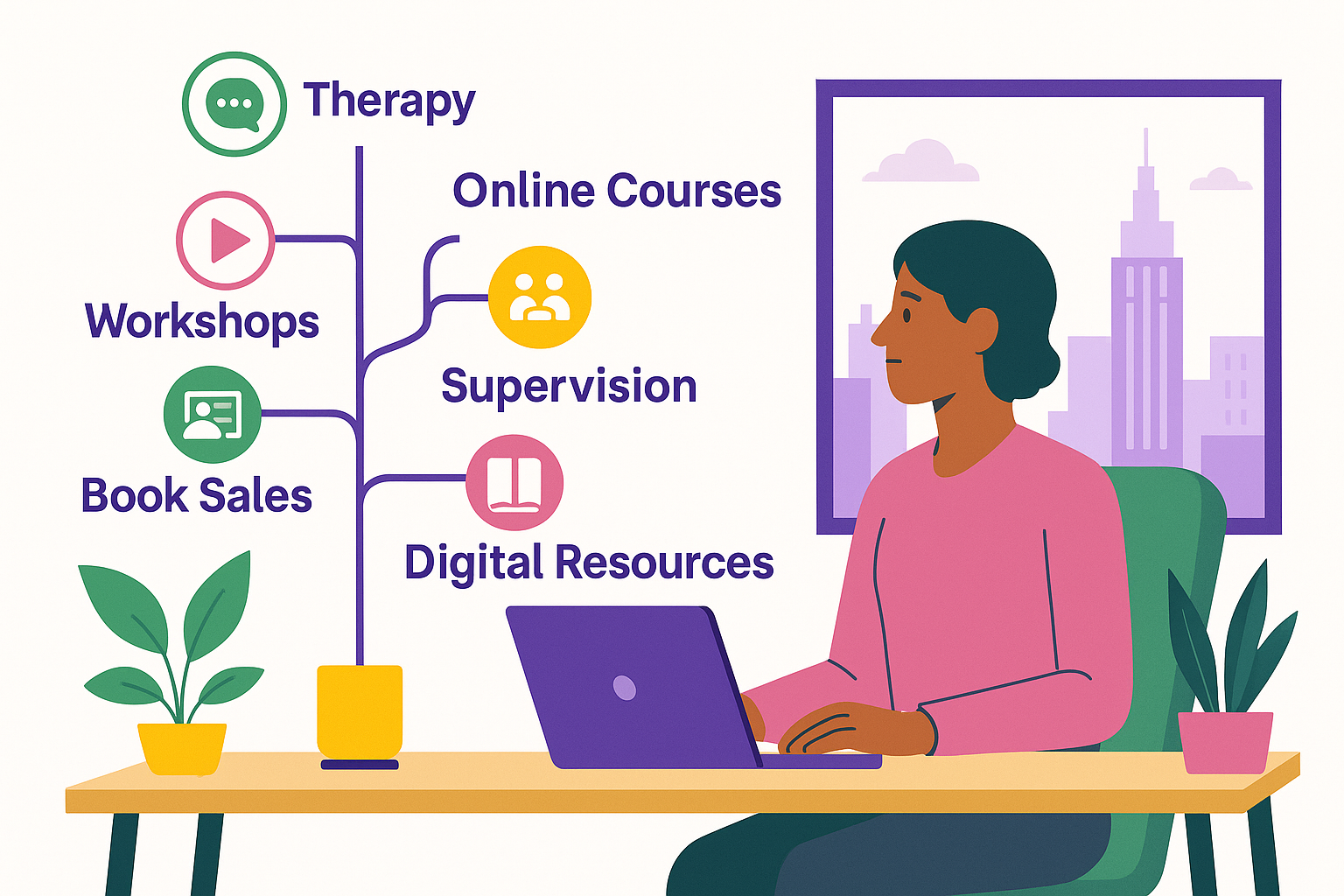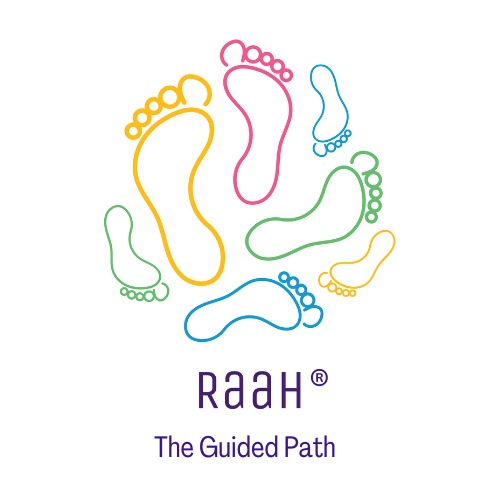Diversifying Skills and Income Streams as an Early-Career Therapist

When we start out in the field of mental health, the most familiar way to earn is through offering therapy sessions. But over time, many early-career therapists begin to ask: Is there more I can do within this field? Can I find other ways to support myself financially while still aligning with my values and skills?
The answer is: yes.
At Raah – The Guided Path, we believe in supporting therapists as they explore and expand their professional journeys. In this blog, founder Prerna Yadav and three therapists seeking supervision at Raah — Radhika Goel, Durva Bhatt, and Dakshita Sabharwal, share how they have diversified their income streams. Their experiences show that exploring multiple avenues doesn’t just bring work satisfaction, financial stability but it can also enhance learning, deepen impact, and create meaningful connections beyond the therapy room.
Why Diversify?
Offering therapy is deeply fulfilling, but it isn’t the only way to contribute to people’s mental well-being. From facilitation and teaching to content creation, there are many meaningful paths early-career therapists can take paths that align with their interests, values, and evolving identities as professionals.
Getting Started: What do they do?
Let’s look at how Prerna, Radhika, Dakshita and Durva approached their own journeys of diversification:
Prerna Yadav
Founder, Raah – The Guided Path | Supervisor | Mental Health Trainer
“Apart from my private practice, I offer supervision and training and mentorship to early-career psychologists. I also collaborate with corporates, educational institutions, and NGOs to conduct workshops and awareness sessions on mental health and well-being. Sometimes, I take up English to Hindi translation assignments of mental health content.”
Radhika Goel
Queer-Affirmative Counseling Psychologist | Dance Movement Therapy Facilitator
“I work as a Dance Movement Therapy (DMT) facilitator, often in community and group settings. I also take up project-based freelance work — this includes workshops, program facilitation, and short- or long-term contracts. Additionally, I design and conduct training courses for psychology students and early-career professionals.”
Durva Bhatt
Counseling Psychologist | Queer-Affirmative Practitioner
“Apart from therapy, I work with organizations to design workshops and content. I also co-lead a Queer Learning Circle with a peer, where we study therapy modalities from books and meet weekly. It’s a rich learning space. I also work as an associate with two different organizations — so my income is a mix of therapy and organizational roles.”
Dakshita Sabharwal
Counseling Psychologist | Expressive Arts Therapist
“I teach 11th and 12th grade psychology to students in CBSE and ICSE boards. Alongside, I also teach creative writing and English. While I do conduct workshops and training occasionally, they are less frequent and usually happen when I’m invited to do so.”
Apart from offering therapy, these are some of the diverse income streams explored by the founder of Raah and therapists associated with Raah.
Challenges and Experiences in Diversifying Income
Diversifying income was not easy at the start. They felt unsure, made mistakes, and struggled with imposter feelings especially when stepping into roles beyond therapy, like conducting workshops or offering supervision. However, over time, with peer support, supervision, and guidance from mentors, they found their footing.
Upskilling played a big role. They enrolled for formal training especially for learning modalities like DMT and IFS. Other skills were learned through practice while exploring opportunities at their previous workplaces, reading, attending webinars on facilitation skills, joining peer groups. Slowly, they began feeling more confident with designing workshops, facilitating groups, managing logistics, setting boundaries, and marketing themselves as freelance professionals.
What made this process manageable was staying connected to peer spaces, being in supervision, and continuing personal therapy. These created a support system that helped them sustain their work across different roles.
How Diversification Helped Financially
The beginnings are likely to be unpredictable and slow. It may not always bring in a lot of income too. However, consistent efforts over time are likely to make a difference.
Radhika shared that diversification supported her financially, though it wasn't always predictable. Juggling multiple roles required more effort, and the pay didn’t always match the input. However, it brought creativity, reduced emotional fatigue, and allowed her to contribute beyond therapy, into community, advocacy, and training. This broadened her impact and kept her work meaningful.
Prerna (Founder of Raah), initially found it challenging to reach therapists for supervision and training. However, over time, with the help of word of mouth referrals and a good social media presence, there was consistency in the volume of work. Balancing roles like supervision, therapy, group training, and content creation helped her stay engaged and avoid monotony. During slower periods in therapy work, she turned to translations, training, or workshops, keeping both her income and impact steady.
Navigating Burnout While Wearing Many Hats
With multiple roles come greater chances of burnout and the therapists shared how they manage it:
Durva learned to manage burnout by knowing her limits. Saying “no,” being mindful of her boundaries, and not trying to “do it all” helped her stay grounded.
Dakshita worked closely with her own therapist to avoid overworking. She spaces out intense days, balances therapy with teaching, and uses a finance tracking app to monitor workload and plan lighter days when needed.
Radhika admitted the balancing act is ongoing. Managing different roles takes mental effort, and there’s pressure to keep each stream going for financial stability. While assigning specific days to certain tasks helps, sustaining that routine takes continued reflection and adjustment.
Emerging Opportunities in the Mental Health Field
According to the therapists associated with Raah, there are several emerging opportunities for income diversification, including:
- Facilitating support groups
- Conducting psychoeducational workshops
- Designing training modules for early-career professionals
- Teaching school-level psychology
- Collaborating with NGOs, schools, or corporates on mental health programs
- Content writing, translation, and self-publishing
- Building peer learning spaces and mentorship programs
These paths allow therapists to contribute meaningfully beyond one-on-one therapy while creating multiple sources of income and expanding their reach.
Insights for Early Career Therapists
Diversifying early in your career can feel overwhelming. Therapists at Raah emphasize that the journey is rarely linear. Their suggestions?
- Think of the communities you would like to interact with and reflect on their pressing issues. Think of how you would like to reach out to them - through in-person workshops, webinars, Instagram lives, content creation.
- Network regularly with professionals from organisations, schools, colleges in your local vicinity. Start having conversations with them about the significance of mental health and how you can contribute to the communities they are catering to.
- Look out for freelance roles on workshop facilitation, content creation and translation on platforms like LinkedIn regularly.
- Post regularly on social media to showcase your expertise on a particular topic. Having a strong social media presence isn’t a prerequisite, but is often an added advantage while you are trying to network
- Seek guidance from senior Psychologists who have diversified their skills.
- Take your time. You don’t need to figure it all out at once. Give yourself permission to explore, reflect, and build at your own pace.
“There is more to this work than therapy, and it is also our professional curiosity that can lead us to create new roles and expand the scope of this field and profession. Not all mental health professionals need to be psychotherapists.” — Radhika Goel, Queer-Affirmative Counseling Psychologist and DMT Facilitator
These experiences of therapists remind us that mental health work extends far beyond therapy. From training and teaching to community work and content creation, your career can grow with your interests.
Take your time, start small, and let your curiosity and values guide you. Stay connected to your purpose and let that shape the path you choose.
At Raah : The Guided Path, we believe in empowering therapists to diversify their skills and offer guidance for enhancing skills like facilitation and content creation. If you are looking for guidance, book a session today by sending a request over WhatsApp +91 9076021573.

Misha Gada
My name is Misha Gada, and I am a 22-year-old Counseling Psychology graduate passionate about promoting mental well-being and reducing the stigma around mental health. I am particularly interested in working with couples and adults, while also exploring and supporting individuals from diverse backgrounds to understand their unique experiences and help them navigate challenges. I strive to create inclusive and supportive therapeutic spaces tailored to individual needs. Outside my professional aspirations, I am an avid reader, love experimenting with new recipes, and enjoy exploring different cafes as a coffee enthusiast.
Related Blogs
No related blogs available.

